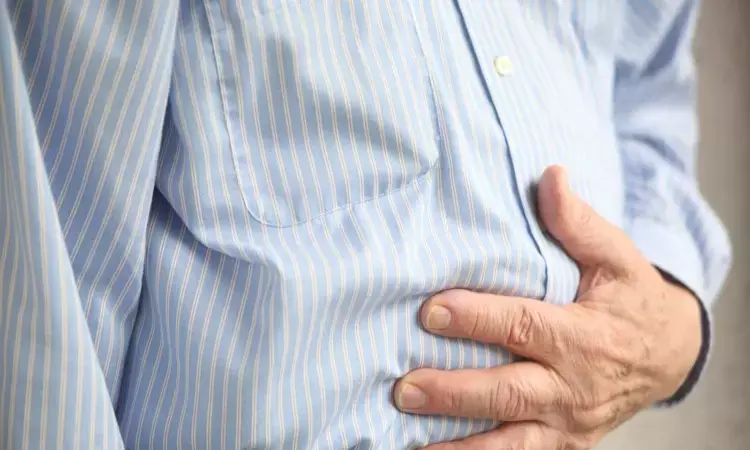- Home
- Medical news & Guidelines
- Anesthesiology
- Cardiology and CTVS
- Critical Care
- Dentistry
- Dermatology
- Diabetes and Endocrinology
- ENT
- Gastroenterology
- Medicine
- Nephrology
- Neurology
- Obstretics-Gynaecology
- Oncology
- Ophthalmology
- Orthopaedics
- Pediatrics-Neonatology
- Psychiatry
- Pulmonology
- Radiology
- Surgery
- Urology
- Laboratory Medicine
- Diet
- Nursing
- Paramedical
- Physiotherapy
- Health news
- Fact Check
- Bone Health Fact Check
- Brain Health Fact Check
- Cancer Related Fact Check
- Child Care Fact Check
- Dental and oral health fact check
- Diabetes and metabolic health fact check
- Diet and Nutrition Fact Check
- Eye and ENT Care Fact Check
- Fitness fact check
- Gut health fact check
- Heart health fact check
- Kidney health fact check
- Medical education fact check
- Men's health fact check
- Respiratory fact check
- Skin and hair care fact check
- Vaccine and Immunization fact check
- Women's health fact check
- AYUSH
- State News
- Andaman and Nicobar Islands
- Andhra Pradesh
- Arunachal Pradesh
- Assam
- Bihar
- Chandigarh
- Chattisgarh
- Dadra and Nagar Haveli
- Daman and Diu
- Delhi
- Goa
- Gujarat
- Haryana
- Himachal Pradesh
- Jammu & Kashmir
- Jharkhand
- Karnataka
- Kerala
- Ladakh
- Lakshadweep
- Madhya Pradesh
- Maharashtra
- Manipur
- Meghalaya
- Mizoram
- Nagaland
- Odisha
- Puducherry
- Punjab
- Rajasthan
- Sikkim
- Tamil Nadu
- Telangana
- Tripura
- Uttar Pradesh
- Uttrakhand
- West Bengal
- Medical Education
- Industry
Reflux recurrence risk after laparoscopic fundoplication similar in Both Erosive and Nonerosive GERD: JAMA

A new study published in the Journal of American Medical Association showed that reflux recurrence risk after laparoscopic fundoplication was similar in patients with nonerosive and erosive gastroesophageal reflux disease (GERD), challenging the notion that nonerosive GERD is less suitable for surgery. The findings suggest that absence of erosive disease on endoscopy should not preclude antireflux surgery.
With a more benign history of the disease and less sensitivity to antireflux drugs, nonerosive GERD is increasingly being seen as a distinct entity from erosive GERD. It is unknown if antireflux surgery works better for erosive GERD than nonerosive GERD. And so, to determine if individuals with nonerosive GERD experience greater reflux symptoms following antireflux surgery than those with erosive GERD, this study was carried out.
All patients in Finland and Sweden who had primary laparoscopic fundoplication for GERD between January 1, 1996, and December 31, 2019 were included in this population-based cohort analysis. Between March and April of 2024, statistical analysis was carried out. The primary exposure was comparing individuals with erosive GERD (i.e., erosive esophagitis found during preoperative endoscopy) with those with nonerosive GERD (i.e., no erosive esophagitis or Barrett esophagus found during preoperative endoscopy).
Reflux recurrence was the primary outcome, which was defined as secondary antireflux surgery or postoperative antireflux medication for at least 6 months. After controlling for age, sex, comorbidity, hospital volume of antireflux surgery, calendar year, and country, Poisson regression yielded hazard ratios (HRs) with 95% confidence intervals.
Of the 6,194 patients who had primary fundoplication, 2700 (43.6%) were diagnosed with nonerosive GERD and 3494 (56.4%) with erosive GERD (median age, 53 years [IQR, 42-62 years]; 3310 women [53.4%]).
In patients with nonerosive GERD (17.1% [461 of 2700]) and those with erosive GERD (17.1% [596 of 3494]), the frequency of reflux recurrence was comparable across a follow-up period of up to 23 years (range, 0-23 years; median, 8.8 person-years [IQR, 4.3-13.5 person-years]).
When examining recurrence by antireflux medication (HR, 1.04; 95% CI, 0.90-1.21) and secondary antireflux surgery (HR, 0.91; 95% CI, 0.75-1.10) separately, patients with nonerosive GERD had a similar overall risk of reflux recurrence as patients with erosive GERD (adjusted HR, 0.98; 95% CI, 0.87-1.11).
The HRs of the different follow-up groups following fundoplication and analyses stratified by the six factors in the multivariable model did not differ from one another. Overall, evidence suggesting nonerosive GERD is less responsive to antireflux drugs contradicts this conclusion. Therefore, the lack of erosive GERD seen during an upper endoscopy cannot be used as justification for skipping antireflux surgery.
Source:
Holmberg, D., Bielik, J., Santoni, G., Ness-Jensen, E., von Euler-Chelpin, M., Kauppila, J. H., & Lagergren, J. (2025). Reflux recurrence after laparoscopic fundoplication for nonerosive gastroesophageal reflux disease. JAMA Network Open, 8(6), e2517754. https://doi.org/10.1001/jamanetworkopen.2025.17754
Neuroscience Masters graduate
Jacinthlyn Sylvia, a Neuroscience Master's graduate from Chennai has worked extensively in deciphering the neurobiology of cognition and motor control in aging. She also has spread-out exposure to Neurosurgery from her Bachelor’s. She is currently involved in active Neuro-Oncology research. She is an upcoming neuroscientist with a fiery passion for writing. Her news cover at Medical Dialogues feature recent discoveries and updates from the healthcare and biomedical research fields. She can be reached at editorial@medicaldialogues.in
Dr Kamal Kant Kohli-MBBS, DTCD- a chest specialist with more than 30 years of practice and a flair for writing clinical articles, Dr Kamal Kant Kohli joined Medical Dialogues as a Chief Editor of Medical News. Besides writing articles, as an editor, he proofreads and verifies all the medical content published on Medical Dialogues including those coming from journals, studies,medical conferences,guidelines etc. Email: drkohli@medicaldialogues.in. Contact no. 011-43720751


